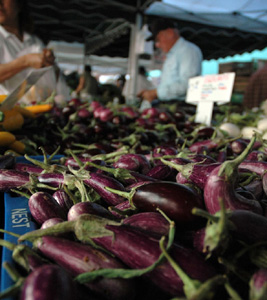
Two weeks ago, I mentioned the rising cost of food around the world. It's been a hot topic lately, and reports are becoming more grim. Costs are starting to hit home in our supermarkets, and warehouse retail chains are even beginning to restrict volume (20 pound) rice sales due to supply issues.
Most sustainable food activists believe that the price of food does not reflect its true price, and that subsidies for crops like corn and soy create artificial prices that keep the price of junk foods and processed foods artificially low. This means unsubsidized, whole foods like farmers market products are more expensive but that they are actually the real price of food.
In an article in the New York Times recently called "Some Good News on Food Prices," Michael Pollan and Alice Waters made the argument that rising food prices will equalize the playing field that is our food system -- organic, local, pasture-raised foods will become feasible options when all food prices are high. "Higher food prices level the playing field for sustainble food that doesn't rely on fossil fuels," said Pollan in the article.
As most know, I am an active voice for voting with your fork and making conscious decisions about where your food dollars go.